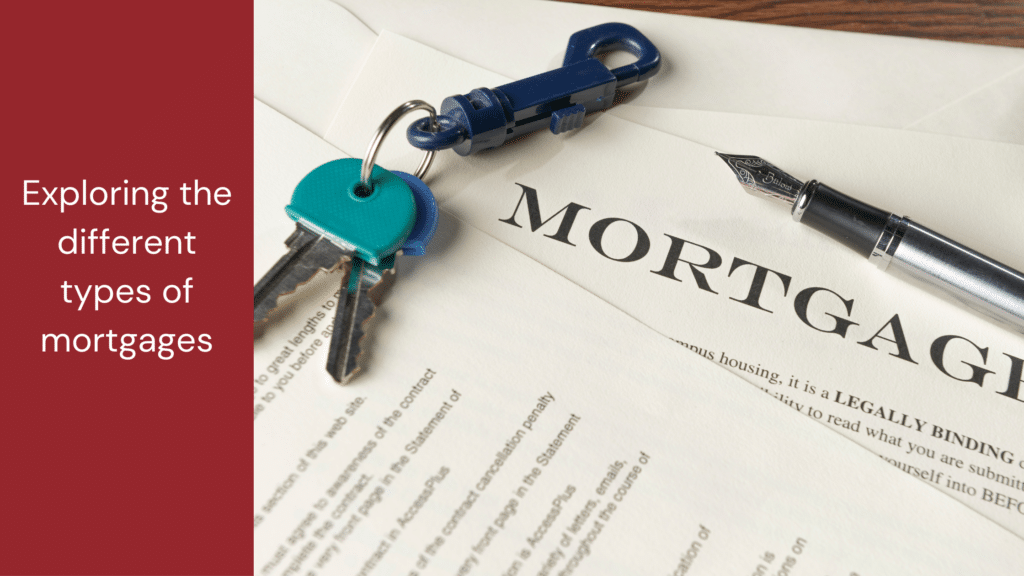Take time to think about what you want and how much you’ll be able to afford
Taking out a mortgage can seem daunting, and it often feels like the lender holds all the cards. So it is worth spending exploring the different types of mortgages available.
Each lender employs its unique criteria to determine whether or not they wish to lend to you. You’ll likely receive swift approval if you fit neatly within a lender’s parameters. However, if your circumstances are less than ideal, you’ll likely face rejection.
Selecting the appropriate mortgage might seem like a labyrinthine task. Still, you must make an informed decision taking your financial wellbeing into consideration and not get swamped by myriad options. This is particularly important for first-time buyers. To aid you in feeling as confident as possible, we’ve collated the primary different types of mortgages so you know precisely what you’re seeking.
Repayment versus Interest-Only Mortgages
Mortgages fall into one of two categories:
- Repayment
- Interest-only
Repayment mortgages, sometimes called capital and repayment mortgages, enable you to borrow enough to purchase a property (less your deposit) and repay that total sum, along with interest, over a specified period.
Interest-only mortgages allow you to borrow sufficient funds to buy a property (again, less your deposit) and then only pay interest on that amount until the end of the mortgage term. You will then repay the original sum, often by selling the property.
Most individuals planning to reside in their property tend to opt for a repayment mortgage. Not all lenders offer interest-only options and those that do typically impose stringent criteria, such as a substantial deposit and a pre-approved repayment method in place to offset the capital at the end of the term.
Many landlords manage their mortgages on an interest-only basis, and lenders generally accept this.
Fixed Rate or Variable Mortgages
Typically repayment mortgages are either fixed rate or variable. Fixed rate mortgages offer set monthly payments that remain unchanged for an agreed period – typically between two to five years, although occasionally longer. While the interest rate is often higher than for variable mortgages, you benefit from the certainty of knowing it won’t increase.
This could lead to savings in the long run. For instance, if the Bank of England’s interest rates rise during your fixed mortgage term, you’ll be relieved that your mortgage payments remain unaffected. Conversely, if the Bank of England interest rates fall, you’d probably prefer your mortgage payments to do the same – but that’s the trade-off for stability.
Variable mortgages feature monthly payments that fluctuate. They may follow the Bank of England interest rates, or they might not.
This depends on which type of variable mortgage you opt for from the following choices:
Variable Mortgages
Variable mortgages come in various forms, each distinguished by how the interest rate is calculated, determining your monthly repayments.
Tracker mortgages follow the Bank of England base rate, with a slightly higher interest rate. This means your monthly repayments will fluctuate in tandem with the base rate.
Standard and Discounted Variable Rate Mortgages
Standard variable rate (or SVR) mortgages are governed by an interest rate set by the lender. Consequently, your payments may vary at the lender’s discretion.
Conversely, discounted variable rate mortgages offer lower monthly repayments than the SVR, thanks to a temporary discount. Once this period concludes, you’ll transition to the standard variable rate.
Any variable mortgage can be capped, ensuring your monthly payments will never exceed a certain threshold. This cap provides some level of protection, though it’s often set relatively high, so careful consideration is advised before committing.
Broadening your mortgage horizons
Beyond the main mortgage types, there are other unique features to consider. Cashback mortgages provide a lump sum when you take out the mortgage but generally incur a higher interest rate on repayments.
Offset mortgages enable your cash savings to reduce the interest you pay on your repayments. By contrast, current account mortgages link your current account to your mortgage, potentially lowering the interest you pay.
Scrutinising aspects of ability to maintain repayments
Applying for a mortgage requires more than just the ability to meet monthly repayments. It’s essential to consider your income, expenditures and potential changes in your circumstances. Mortgage lenders will scrutinise these aspects to gauge whether you can maintain repayments should interest rates escalate or circumstances alter.
Calculations behind mortgage approvals
Mortgage lenders primarily base their decisions on the loan-to-income ratio. This is a simple calculation: the amount you desire to borrow is divided by your earnings. The maximum you can typically borrow is often restricted to four-and-a-half times your annual income.
Affordability assessment is a key determinant
Lenders also conduct an affordability assessment, considering your outgoings alongside your income to calculate the monthly payment you can manage. This crucial step helps them determine your financial capability and resilience in the face of changing circumstances.
Stress testing your ability to repay
Aside from assessing your present financial situation, lenders also contemplate the future. They perform a ‘stress test’ to evaluate your ability to repay the mortgage under different scenarios. This could include rising interest rates or lifestyle changes like redundancy, starting a family or taking a career break.
Lender’s discretion on loan amounts
If lenders perceive that you may struggle with your mortgage payments under these potential circumstances, they will typically limit how much you can borrow. This precautionary measure ensures that both you and the lender are protected from potential financial distress.
How can we help you on your mortgage journey?
Securing a mortgage is more than just paperwork. It requires thorough financial preparation. Before undertaking a mortgage affordability check or arranging a mortgage interview, ensuring your finances are in top shape is crucial. The great thing is, we have access to a comprehensive panel of lenders and we do not charge you a broker fee so book a call and let us see how we can help you choose the most suitable mortgage for your situation.

At Yes Mortgage Services, we offer a comprehensive range of products from across the market.
Irrespective of whether you are looking to buy a new home, re-mortgage an existing property, or looking to protect your family from the unpredictability that life throws at it or protect your income if you are unable to work due to accident or ill health.
Yes Mortgage Services are committed to offering you the highest possible standards of service. We can undertake the whole process from answering the initial questions through to handling multiple product applications. Ensuring that everyone gets treated with the same urgency and maintaining your best interests are our main goals irrespective of the value of the mortgage.
We recognise that both we and our customers have everything to gain if we look after your best interests and treat you fairly in all aspect of our dealings with you.




